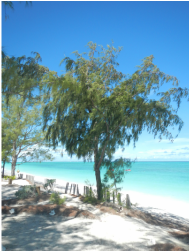
This is not a political blog, but I've been thinking a lot about immigration lately because of a novel I'm reading: Americanah, by Chimamanda Ngozi Adichie.
The book follows several Nigerian migrants who move to Britain and America, both legally and illegally, to better their lives. America, especially, is not what they had imagined. They struggle in the under-economy to get the fake documentations that will allow them to work, work, work toward a dream based on films, commercials and hearsay.
As I am reading this book while on North Caicos, it strikes me that the struggles and misunderstandings to the opposite way, too. So many people from the U.S. dream about moving here, or some other island in the sun, with thoughts of living a Jimmy Buffett life. There will be margaritas on the beach, a hammock strung between palm trees and platters of tropical fruit. Indeed, an entire tourist industry has capitalized on these dreams.
Visiting the islands and living in the islands, however, are quite different things. Those who toss it all in for the carefree life often don't foresee the difficulties of dealing with the high prices at the end of the supply stream (gas at $6.50 a gallon, $20 for eight ounces of cheese), the harsh climate, an unfamiliar bureaucracy and the prejudice. (Yes, there is.)
Even those rich enough to glide through Customs and Immigration snags, afford the beachfront property and avoid the worry of maintaining homes and vehicles in salt air and bright sun can trip up. All that indolent hammock-swinging gets old. The fun of alcohol becomes a crutch, a way to blur through useless days. Permanent vacation is no trip to the beach.
This isn't to say that one can't be happy in the islands ... or America, or England, or wherever the dream lies. Places always hold potential; they don't hold promises.
Or, in the words of a long-ago soft drink commercial: "Nothing difficult is ever easy."
The book follows several Nigerian migrants who move to Britain and America, both legally and illegally, to better their lives. America, especially, is not what they had imagined. They struggle in the under-economy to get the fake documentations that will allow them to work, work, work toward a dream based on films, commercials and hearsay.
As I am reading this book while on North Caicos, it strikes me that the struggles and misunderstandings to the opposite way, too. So many people from the U.S. dream about moving here, or some other island in the sun, with thoughts of living a Jimmy Buffett life. There will be margaritas on the beach, a hammock strung between palm trees and platters of tropical fruit. Indeed, an entire tourist industry has capitalized on these dreams.
Visiting the islands and living in the islands, however, are quite different things. Those who toss it all in for the carefree life often don't foresee the difficulties of dealing with the high prices at the end of the supply stream (gas at $6.50 a gallon, $20 for eight ounces of cheese), the harsh climate, an unfamiliar bureaucracy and the prejudice. (Yes, there is.)
Even those rich enough to glide through Customs and Immigration snags, afford the beachfront property and avoid the worry of maintaining homes and vehicles in salt air and bright sun can trip up. All that indolent hammock-swinging gets old. The fun of alcohol becomes a crutch, a way to blur through useless days. Permanent vacation is no trip to the beach.
This isn't to say that one can't be happy in the islands ... or America, or England, or wherever the dream lies. Places always hold potential; they don't hold promises.
Or, in the words of a long-ago soft drink commercial: "Nothing difficult is ever easy."
 RSS Feed
RSS Feed